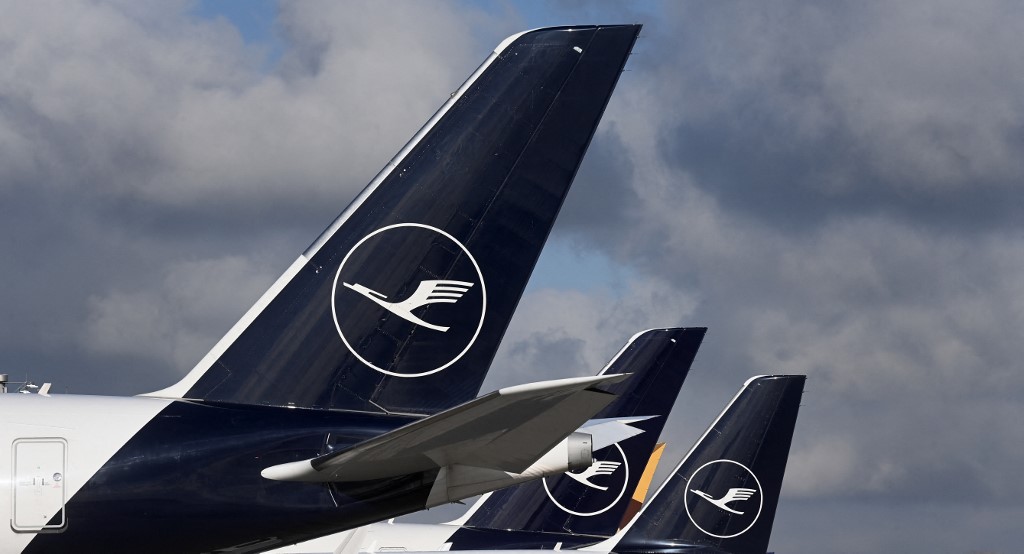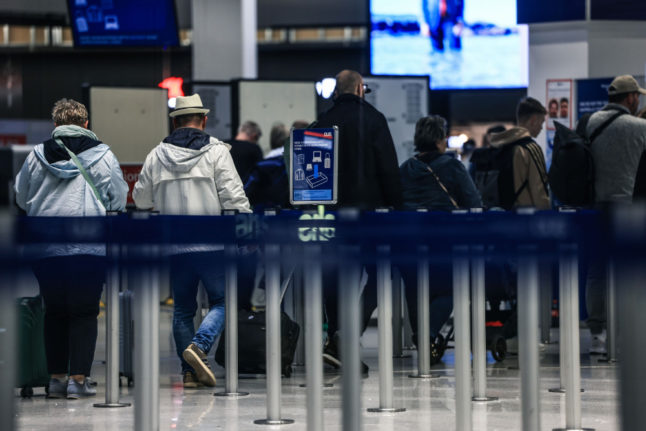The German labour union Verdi has called on aviation security staff at eleven major airports in Germany to go on strike for the whole day.
As a result, the airport association ADV estimates that around 1,100 flights will be canceled or delayed, affecting around 200,000 passengers.
READ ALSO: Airport chaos expected in Germany as security staff plan strikes on Thursday
Where will the strikes take place?
According to union Verdi, the actions will be taking place at the following airports: Frankfurt, Hamburg, Bremen, Berlin, Leipzig, Düsseldorf, Cologne, Hanover, Stuttgart, Erfurt and Dresden.
Munich and Nuremberg airports are not affected by the Verdi strike, so it can be assumed that operations at both will continue as planned. Their aviation security staff are employed in the public sector, for which a different collective agreement applies.
Several airports such as Berlin, Hamburg and Stuttgart have axed all take-offs, while Düsseldorf and Cologne say they want to maintain some operations.
Around 80 percent of the flight movements that were planned for Thursday in Cologne/Bonn were cancelled there, according to the airport website early Thursday morning.
In Düsseldorf, on the other hand, only a third of flight movements were cancelled, with two-thirds scheduled to take place throughout the day on Thursday.
When will the strikes begin?
The work stoppages at the Cologne/Bonn airport began Wednesday evening at 9 pm because there is no night flight ban there. The others started on Thursday morning.
Verdi representative Özay Tarim told DPA that they wanted to send out a clear signal. The employers had behaved “unacceptably” in the negotiations so far.
“We will now put pressure on the employers with employees so that we can finally make progress at the negotiating table,” he said.
Germany’s largest airport, Frankfurt, also planned to operate 1,050 flights on Thursday. German carrier Lufthansa said that it would fly most of its long-haul flights on Thursday. Shuttle flights for passengers transferring flights will also be offered.
However, there may be longer waiting times in the transit area. The company is offering free re-booking until February 8th.
What to do if you have a flight booked for Thursday
Passengers for domestic German flights can exchange their ticket for a Deutsche Bahn ticket free of charge, regardless of whether their flight takes place or not.
If you have a flight scheduled, check the flight’s status before travelling to the airport.
Information on Lufthansa flights is updated on their website, and can be re-booked through the Service Centre.
According to EU rules, airlines must either refund or reschedule flights for passengers when flights are cancelled, even if it means using a different carrier. You may also be entitled to additional compensation or accommodation expenses.
Due to the strike, Lufthansa has offered free rebookings for customers on flights departing before or after February 1st for the period between January 30th and February 8th. This also applies to international travellers with a connection at Frankfurt Airport.
If you are booked on a domestic flight, you may be able to find a train to your destination instead. Lufthansa allows customers to swap airfare for a train ticket freely on their website.
READ ALSO: What are your rights in Germany if a flight is delayed or cancelled?
‘Too many strikes’: Criticism of latest action
Aviation security staff are active at checkpoints for passengers, baggage and staff. Without them, normal operations would not be possible. Air traffic is therefore likely to be paralysed in large parts of Germany.
Verdi is demanding, among other things, higher salaries for the approximately 25,000 employees nationwide.

ADV Managing Director Ralph Beisel told DPA that a solution should be sought “at the negotiating table” and not at the expense of passengers.
Beisel added that the constant wave of strikes around Germany was having a damaging effect on the economy.
The drivers’ union GDL wrapped up a five-day strike early Monday morning for all long-distance and regional train transport.
And on this upcoming Friday, local transport around Germany we be largely halted as Verdi called on workers from various transport associations to down their tools in the latest push for better pay and working conditions.
“We see strike announcements almost daily in Germany to the detriment of mobility and the economy. This must be stopped,” said Beisel.
READ ALSO: Where will public transport in Germany be affected by strikes on Friday?
What are security workers demanding?
On behalf of the workers, Verdi is demanding €2.80 more pay per hour, higher function bonuses and overtime pay from the first hour of overtime. The new collective agreement is set to run for one year.
Currently, aviation security assistants in the lowest pay group earn €20.60 per hour, which adds up to a gross salary of just under €3,300 for 160 monthly working hours. In addition, there are bonuses for night work, Sundays and public holidays as well as overtime.
The demand takes into account the loss of purchasing power due to inflation and includes a wage increase, explained Verdi.
According to the employers from the Federal Association of Aviation Security Companies (BDLS), the security workers have been offered four percent more pay for this year and three percent for next year. In addition, overtime bonuses are to be paid earlier than before.
Verdi’s demands add up to €250 million in additional costs this year alone, said a BDLS spokesperson. Contrary to the union’s claims, not every wage increase can be refinanced via aviation security fees.
The wage negotiations are to continue on February 6th and 7th in Berlin.
The last time there were warning strikes in aviation security was in spring 2023 – with a significant impact on operations.
READ ALSO: The strikes that could hit life in Germany in 2024



 Please whitelist us to continue reading.
Please whitelist us to continue reading.
Member comments